Report Card


Cross County Elementary Technology Academy made a commitment to weaving character training throughout its school day. Students learn about seven core values, each associated with a “Creature of Character.” One value is humility, which is represented by the self-sacrificial honeybee. The school’s motto for that value is, “Humility isn’t thinking less of yourself, but thinking of yourself less.” Teachers tie the core values into lessons and praise students for exhibiting them. Counselor Carly Owens, pictured here, spends 40 minutes every two weeks in each classroom leading students in character-building activities. Student discipline has improved, disruptions and insubordination are down, enrollment is up, and teachers are staying at the school. Others are taking notice, as the school is a finalist for a prestigious T4 Education World’s Best School Prize.
ASBA’s annual fall regional meetings have been scheduled at 14 locations for Oct. 2-30.
The meetings will be held from 5:30 until 8:30 p.m. at all locations School board members can earn three hours of boardsmanship training credit for attending.
Register at ASBA’s website, www. arsba.org. A registration fee will be charged to cover the costs of materials and dinner.
This year will bring together local elected representatives to share their perspective as well as a panel of school board members from each region to talk about the issues and challenges they face.
These sessions create space for board members to learn from one another,
share experiences, and discuss challenges unique to their communities.
Dates and locations for the meetings are as follows:
• Region 1 – Rogers Professional Learning Center, Oct. 13
• Region 2 – Yellville-Summit High School Cafeteria, Oct. 20
• Region 3 – Hillcrest High School Café in Strawberry, Oct. 30
• Region 4 – Clarksville High School Cafeteria, Oct. 23
• Region 5 – Dardanelle High School, Oct. 7
• Region 6 – Bald Knob District Office, Oct. 21
• Region 7 – Harrisburg Elementary Café, Oct. 6
• Region 8 – North Little Rock School District, location to be determined, Oct. 28
• Region 9 – DeWitt High School Café, Oct. 6
• Region 10 – Peake Elementary School in Arkadelphia, Oct. 2
• Region 11 – Watson Chapel High School Cafeteria, Oct. 9
• Region 12 – Horatio High School, Oct. 16
• Region 13 – Smackover First Baptist Church, Oct. 27
• Region 14 – Hamburg Middle School, Oct. 14
For more information, contact Deputy Executive Director Tammie Reitenger at treitenger@arsba.org
ASBA News and Notes continues on page 5













T he J ournal of T he a rkansas s chool B oards a ssociaT ion

24
Cross County Elementary Technology Academy counselor Carly Owens spends 40 minutes every two weeks in each classroom leading students in character-based lessons. Teachers incorporate seven “Creatures of Character” that use an animal to reflect a core value. Those values are humility, self-discipline, compassion, respect, courage, integrity and gratitude.
The Monticello Billies basketball teams played last season in a new 51,841-square-foot arena. During the day, students walked through the doors of a new high school addition. And it’s all because voters approved extending a bond issue in February 2022 that raised $26 million without a tax increase.
love the school. ... I love the kids.’
Shane Cuzick proudly displayed the screensaver on his phone during a break at ASBA’s New Board Member Institute in Hot Springs June 17. It was a Lincoln Wolves logo.
School boards must allow patrons to speak at board meetings and can’t limit the number of speakers, but they can limit them from speaking about issues over which the board has no control. Those were some of the insights about Act 902 offered by ASBA Policy Director and Staff Attorney Lucas Harder at an ASBA “Lunch and Learn” webinar July 2.
mind
Participants at ASBA’s Fall Leadership Institute Sept. 4 discussed vision, mission, goals, and strategic planning.
Cover / Cross County character
Cross County Elementary Technology Academy incorporates seven core values represented by “Creatures of Character” throughout the school day. Behavioral issues are down, teachers are staying put, and the school is one of 10 finalists for a worldwide award.
The filing period for the 2026 school board elections will be open from noon Nov. 3 until noon Nov. 12, with elections occurring on March 3, 2026.
Individuals considering running for school board, as well as current board members up for reelection, should be aware of updated timelines and new legal requirements.
Act 503, passed by state lawmakers during the legislative session this year, mandates that all school board elections must now occur only in even-numbered years and will be held in conjunction with the preferential primary election, which is the first Tuesday after the first Monday in March.
Runoff elections, if needed, will occur as part of the general election on Nov. 3, 2026.
School board terms must now be either four or six years, and districts are required to stagger elections to ensure an approximately equal number of positions are on the ballot each cycle. Current board members’ terms will be adjusted to expire according to specific timelines laid out in the act.
The candidate petition circulation period opened Aug. 14. Early voting begins Feb. 17.
Other important dates in the election cycle include:
• Dec. 22, 2025 is the district deadline to submit millage information to the county clerk.
• Jan. 1, 2026 is the deadline to publish the proposed budget.
• Feb. 2, 2026 is the last day to register to vote.
Arkansas 11th and 12th graders are invited to participate in the 2025 ASBA Student Essay & Speaking Contest. Applications are due by 4 p.m. Oct. 24.
Winners will present their ideas live at the 2025 ASBA Annual Conference on Dec. 11-12 at the Little Rock Marriott and Statehouse Convention Center.
The Topic is “The Heart of School.” Speakers may want to discuss qualities or experiences schools should nurture beyond academics, how schools can help prepare students for real-world challenges, the role of school boards and local leadership in supporting these opportunities, the long-term effect of these nonacademic lessons, and how “The Heart of School” connects to building a stronger future for Arkansas.
Participants will submit a 4-5-minute video and 600-750-word essay. The winner will receive $1,000. Other prizes
are $750 for 2nd place, $500 for 3rd place, and $250 for honorable mention. Each ASBA member district is allowed one submission and may choose its method for selecting its applicant. Contest rules and a link to the online application can be accessed at https://5il. co/3otb2, or at ASBA’s website, www. arsba.org. For more information, contact ASBA Deputy Executive Director Tammie Reitenger at 501.492.4822 or at treitenger@arsba.org
The Arkansas School Boards Association is accepting applications for the 2025 Board of Excellence in Leadership Award until Oct. 1.
The annual award recognizes Arkansas school boards that exemplify exceptional leadership, dedication to student achievement, and a commitment to excellence in governance.
The winners will be announced and recognized during the ASBA Annual Conference on Friday, December 12.
Two awards can be bestowed each year: One for a school district with student enrollment below 1,500, and another for a school district with student enrollment above 1,500.
The full award description and criteria are available at ASBA’s website, www.arsba.org


by Jeff Lisenbey
The much anticipated start of the school year is here, and now is the time to start implementing our strategic plans that will lead to the outcomes we envision. During our weekly business meeting at my office, we were discussing anticipated end-of-the-year outcomes, and that led us to look closely at our processes that influence the outcomes. I want to express gratitude to everyone involved in every process associated with our educational systems for their part in producing the outcome of accomplished students who are ready for employment in our communities, enrollment in higher education, or enlistment in our armed forces.
In my hometown of Sheridan, our district is the largest employer in the county. We have more than 500 employees who are crucial to every child’s success. We can never minimize the importance of staff that can be the deciding factor in a child’s success. Without each and every one of them, the process could not function properly.
I am grateful for every bus driver in the district. This is not the most glamorous job, but our bus drivers are usually the first school employee to greet a child. The love they show our children makes a difference, and their influence is lasting. In addition, there is no way we can educate the children if we do not get them to our campuses safely. Our drivers are a huge part of the process!
I am equally grateful for our cafeteria staff. It can be chaotic trying to feed a large number of children in a short period of time, but without the proper nutrition, the learning process can be stalled. I remember the names of all the cafeteria ladies when I was in high school. Every kid is different, but food spoke to this young man, and I loved my lunch ladies!
I am grateful for all of our paraprofessionals and teacher’s aides. Whether
they are office workers that help assist in daily operations, or they are interventionists in our buildings, their service is crucial to our success. I can definitely tell you some success stories that I hear from parents. One parent simply wanted to let me know as the board president that her child with special needs had flourished that year because of the para in the classroom.
I am obviously grateful for our teachers. They are true heroes! It is a tough job with an inadequate salary. However, it is the most important job in the world. Where would any of us be without our teachers? I am sure that we can all name several teachers throughout our educational experience who had a positive effect on us. I will never forget Ms. Rundell in 4th grade. My bank account security question is tied to her! (Please don’t hack my account.)
I am grateful for our coaches. Oftentimes, children only want to come to school because of their extracurricular activities. When you have leaders in coaching positions, the level of influence can extend from the field to the court to the classroom. Coaches can bridge the gap and help a child succeed academically. In addition, the numerous hours of preparation often put them well below the minimum wage level.
Finally, I am thankful for our administrators. As board members, we tend to deal primarily with the superintendent and central office, and we help them devise the strategic plan and then support them during its implementation. I want to express sincere gratitude to all of them for how they lead our districts. Culture is key. If there is not a culture in our buildings that promotes collaboration of all of the parties mentioned above, we will not succeed. I hope everyone’s school year has started successfully. Make sure to tell someone THANK YOU!!
Vol. 19, Number 3 September 2025
P.O. Box 165460 / Little Rock, AR 72216
Telephone: 501-372-1415 / 800-482-1212
Fax: 501-375-2454
E-mail: arsba@arsba.org / www.arsba.org
President: Jeff Lisenbey, Sheridan
President-elect: Doris Parham, Bearden
Vice President: Nikki King, Pangburn
Secretary-Treasurer: Travis Warren, Farmington
Region 1: Suzanne Spivey, Rogers
Region 2: Jason Jones, Yellville-Summit
Region 3: Joe Sheppard, Jonesboro
Region 4: Beth Ulrich, Paris
Region 5: John Gibson, South Conway County
Region 6: Keith Baker, Riverview
Region 7: Shane Bell, Cross County
Region 8: Graham Peterson, Mt. Vernon-Enola
Region 9: Donna Dunlap, Barton-Lexa
Region 10: Lonell Lenox, Hot Springs
Region 11: Carl “Buddy” Puckett, Poyen
Region 12: Laura Clark, Blevins
Region 13: Renee Skinner, El Dorado
Region 14: Debra Barnes, Crossett
Staff
Executive Director: Shannon Moore
Deputy Executive Director/Board Development Director: Tammie Reitenger
Finance Director: Diana Woodward
Policy Director/Staff Attorney: Lucas Harder
Database Administrator/Commercial Affiliates Manager: Kathy Ivy
Board Liaison Manager: Angela Ellis Communications and Technology Director: Jessica Prothro
General Counsel: Jay Bequette
Risk Management Program & Workers’ Comp: Krista Glover
Misty Thompson
Linda Collins
Lisa Wigginton
Kara Worley
Julianne Dobson
Tamra Polk
Chelsea Ivy
TO CONTACT THE MAGAZINE
Please contact Steve Brawner, Editor
501.847.7743; brawnersteve@mac.com
Report Card is published quarterly by the Arkansas School Boards Association. Copyright 2025 by the Arkansas School Boards Association and Steve Brawner Communications. All rights reserved.
The Arkansas School Boards Association is introducing its new monthly podcast, ASBA BoardCast: Questions Answered, Challenges Explored, with the first episode set to be released in the near future.
The podcast is designed to serve as a resource for board members and school administrators by addressing questions coming from the field and exploring broader challenges facing Arkansas schools.
Each podcast episode will be 30 minutes or less and will begin with a guiding question that leads into a conversation with guests and with subject matter experts.
The goal is to provide practical insights, highlight best practices, and
offer strategies that support effective leadership.
With the tagline “Your Questions. Our Conversations. Shared Solutions,” the podcast will emphasize a conversational format that will connect Arkansas school leaders to meaningful discussions.
Episodes will be recorded monthly and will be available in both audio and video formats.
The first episode will be “All About ASBA.” ASBA staff members will introduce themselves and will share about the services offered by the association.
Through this new offering, ASBA aims to provide members with timely information and perspectives that strengthen governance and keep the focus on student success.
The podcast will be available on all major podcast platforms, on YouTube, and on the association’s website, www. arsba.org.
ASBA News and Notes continues on page 9

The One Big Beautiful Bill reshaped solar incentives—but the window won’t stay open. To secure the full 30% ITC, projects must start by July 3, 2026.
With 29 districts already energized and 6 under construction, Entegrity helps schools plan now and capture the savings. Planning always starts with a free assessment.
800.700.1414 | info@entegritypartners.com

No tax increase needed for arena, high school expansion, tennis courts and softball turf
The Monticello Billies basketball teams played last season in a new 51,841-square-foot arena. During the day, students walked through the doors of a new high school addition.
And it’s all because voters approved extending a bond issue in February 2022 that raised $26 million without a tax increase.
The bond issue, handled by Stephens Inc., paid for a new basketball arena that opened in December. It has a stadium seating capacity of 1,915 and total seating capacity of 2,861. Clark Contractors managed the construction.
In addition to the arena, the bond issue paid for a 2,511-square-foot addition to the high school entrance for space, security and appearance. Previously, the front door was in the back of the school, so there was no real entrance, said Superintendent Sandy Lanehart.
“I wanted to have that look,” she said. “Our building’s in great shape, and when we [added] that, it looks like a brand new building.”
The bond issue also paid to add turf to the softball field. The school hosted state tournaments in May in softball and baseball in addition to hosting a regional basketball tournament this year. The bond issue also paid for the construction of six tennis courts as well as parking facilities.
Lanehart said the district had $9 million in its facilities fund as result of careful budgeting. She said that when she arrived, the district was overstaffed, so she reduced payroll through attrition. In addition, the bond’s proceeds were better than expected.
School board member Keith Wells said he wanted his district to have the same amenities he had seen refereeing basketball games across the state. He said Monticello is a focal point for south Arkansas schools.
“Everybody has to come through Monticello. That’s our selling point,” he said.
Wells played basketball at Monticello until the 10th grade and was an All-State football player in 1984.
“All the school board members, all us are all Monticello Billies,” he said.
He credited Lanehart for her leadership, knowledge of finances, and experience. She has 55 years of education experience including 16 in Louisiana and 28 in Star City.
Lanehart said many teachers, faculty and staff members are Monticello High
graduates who returned to the school to work.
She said that fact validates their educational experiences there.
Wells agreed, quoting the late Warren School Board member and ASBA Regional Director Jerry Daniels, who also was a basketball referee.
“As the great Jerry Daniels said, ‘Why go somewhere else when you can come back here? We need you at home,’” he said.
The Arkansas School Boards Association is accepting proposals from now until Oct. 17 for presentations for its 72nd Annual Conference Dec. 10-12.
The association is seeking engaging sessions that inform, inspire, and equip Arkansas school board members to fuel success in their districts. The conference’s theme is, “Mission Possible – Local Leadership, Lasting Success.”
Final selection of presentations will be made, and applicants notified, by Oct. 31. Presentations should target board members as the primary audience; enhance board members’ knowledge, skills and abilities with an emphasis on improving student outcomes; preferably include a school board member; and demonstrate innovative ideas and solutions
Presentations should address one of the following topics:
• Board members’ legal and ethical responsibilities
• School laws and regulations
• Board member roles and responsibilities
• Board/superintendent relationships
• Board ethics
• Student achievement
• Community relations
• School operations
• Interpreting and applying school finance concepts
• Student discipline and safety
• Effective governance practices
• Effective leadership and accountability
• Learning and leadership
Prospective presenters must submit a form that is available at the following link: https://bit.ly/acrfp25. For answers to questions, contact Tammie Reitenger at treitenger@arsba.org or at 501.492.4822
Nominations for the Dr. Daniel L. Pilkinton Award are due by Oct. 15.
The Dr. Dan Award annually honors individuals who have made significant contributions to Arkansas education. Established in 1993, this prestigious award honors Pilkinton’s legacy as a lifelong advocate for Arkansas public education and as ASBA’s first executive secretary. It is awarded in a surprise announcement at the Annual Conference.
Individuals qualify if they have made a singular act of exceptional service or have made contributions over a number of years. ASBA-member school boards, individual board members, and superintendents of ASBA-member districts may nominate.
Submit nominations for the award at bit.ly/drdan25


can take care of your school district’s lighting needs. From installation and upgrades to repairs and planned maintenance, LUMATECH can maximize efficiency and minimize costs.

‘I love the school. ... I love the kids.’
Shane Cuzick proudly displayed the screensaver on his phone during a break at ASBA’s New Board Member Institute in Hot Springs June 17. It was a Lincoln Wolves logo.
The annual Institute gave newly elected board members like him a oneday crash course covering their roles and responsibilities.
Cuzick, a notetaker, heard presentations about board governance, school finance, the Freedom of Information Act, and school safety and student discipline.


Cuzick grew up in Lincoln, graduated from Lincoln High in 1993, and, aside from his military experiences, has spent his life in the northwest Arkansas community that is 19 miles west of Fayetteville. His grandfather served on the school board. His wife, Chrissy, is a pre-K teacher, and they often participate in school activities. His oldest daughter graduated this year. His twin daughters are eighth-graders.
When the outgoing board president, Kenneth Albright, Cuzick’s best friend from school, urged him to run for school board, Cuzick put his name on the ballot for this year’s election and didn’t have an opponent.
“I want to be there because I love my community,” he said. “I love the school. I love the people that work there. I love the kids. I want everybody that goes there to succeed and be proud that, ‘I went to Lincoln.’ I don’t want people to
go, ‘Well, where is that?’ I want people to know where that is. I want people to be excited and say, ‘Hey, I got my education from there.’”
One of the reasons the AT&T premises technician ran for the board was to help his school district prepare for the growth he is certain is coming. Despite its proximity to Fayetteville, Lincoln has retained much of its rural character. But Cuzick believes that what happened to Farmington, the district between the two cities, will happen to Lincoln. When he was growing up, Farmington was a small community. Now it’s a 5A school. Other nearby rural districts have also grown as the region has grown. A subdivision has already been proposed for a piece of property next to Lincoln High.
Among the speakers Cuzick heard at the Institute was Jeff Lisenbey, president of the Sheridan School Board and ASBA’s current president. Lisenbey

DR. BARRETT PETTY with Conway Public Schools asks a question during the New Board Member Institute. Petty was one of three new board members elected to the Conway School Board in May.
spoke about “School Board Governance: Roles, Responsibilities & Best Practices.” He led board members in listing their 10 responsibilities: attend meetings, manage finances, comply with the laws, employ staff, employ the superintendent, visit schools, evaluate the superintendent, create policies, create a vision/mission statement, and engage in professional development.
He said the school board should be strong in governance and focused on student achievement so graduates can be ready for college, employment or enlistment in the military.
“Every decision you make in your mind, you should say, ‘Is this what’s going to be best for kids?’” he said. “Because let me tell you, you’ll hear a bunch of noise out in the community on every situation. And I try to tell them, it’s just noise. It’s just noise. You’ve got to block out the noise. You make the decision that’s best for kids, and you can’t be wrong.”
Lisenbey said school board members employ staff based on the administration’s recommendations. In Sheridan, the process starts with a committee that interviews prospective employees. It then works its way up to the principal and the superintendent, who then recommends the hire to the board.











The board usually approves the recommendations, but it’s OK to ask questions, Lisenbey said.
The most important hire is the superintendent, whose relationship to the board Lisenbey likened to a marriage. Board members don’t want to repeat the superintendent hiring process again and again. Qualified individuals are in short supply. Boards should be thorough and ensure the prospect’s values align with the community’s. After the hire is made, board members evaluate the superintendent. Those evaluations should be specific enough to be meaningful.
Lisenbey emphasized the importance of transparency. Voters expect boards to be honest and trustworthy. He displayed with permission a photo of a patron he called “Granddad Glen.” A former board member, Granddad Glen aggressively holds current board members accountable. If he believes the
board isn’t being transparent, he will make a Freedom of Information Act request. If he believes the board isn’t acting in a trustworthy manner, he will gather 50 patron signatures to require it to meet.
“Most of y’all can probably tell me who your Granddad Glen is in your district,” Lisenbey said. “You don’t have one? Let me tell you: Since covid, there’s a bunch of them. Covid was a tough time. It was really easy to be on the board before covid. But when you started getting those 150 people show up at our board meeting to argue about whether somebody should wear a mask or not? That was pretty tense. Even our board was divided on that. But guess what? It’s OK to be divided. It’s OK to be transparent and say exactly what you think. But … as a board, once you vote, whatever it is, support it. Move on.”
Among the other topics Lisenbey covered was Act 902, a law passed by legislators this year that requires boards to allow any member of the public to offer at least three minutes of comment at a meeting. Boards can prohibit comment on personnel and student disciplinary matters. If the public comment period would last more than 30 minutes, the law says the board may require comments for items not on the agenda to be held after the other agenda items are completed.
Lisenbey said agendas exist to create an orderly flow. One way to do that is through a consent agenda, where items with a consensus agreement can be dispensed with one vote. Meetings should start by celebrating student success. By law, a portion of the agenda must cover student achievement.
“How do you act in a meeting?” he said. “You’ve got to be courteous. You’ve got to be respectful. You’ve got to be open-minded if somebody’s
going to have a different opinion than you. Guess what? We don’t know everything.”
Lisenbey shared the successes enjoyed by one of his principals, Heather Williams. She was hired after East End Middle School received the district’s only “D” on the state report card. She was in the classroom every day helping teachers become more effective. Rather than see her activities as intrusive, teachers saw her as being helpful. Now teachers want to transfer to that building.
“She took some things, and she focused on student achievement,” he said. “The culture in her building is second to none, and she took all of that, and it drove it like a fast train straight from a D to an A. That’s just kind of unheard to go that far that quick.”
In another session, ASBA’s general counsel, Jay Bequette with Bequette, Billingsley & Kees, presented a session

covering the Freedom of Information Act.
Bequette said Arkansas’ law is one of the nation’s broadest if not the broadest. Continues on next page

“This
The training assists school staff in their ability to prevent, report and protect themselves and their students from an active shooter during the critical moments they are waiting for police to arrive. It also educates school staff about what to expect from officers once they are on site.



A law passed in 2023 allows school attorneys to attend executive sessions for limited purposes. Until then, they could not do so.
“Our colleagues across the country just could not believe that,” he said. “They’d say, ‘Well, hey, how would you discuss strategy in pending litigation, or how to respond to an offer you made where you’re negotiating with a landowner about purchasing or selling land?’ And we would go, ‘Well, we have to talk to them in public session or write them a letter that is open to inspection to the public.’ And they’d go, ‘Well, that’s crazy.’ And we said, ‘Well, yeah, it kind of is.’”
FOIA requires the local media to be notified before any meeting occurs. Its definition of “meeting” is very broad. A meeting occurs when two or more board members discuss school business upon which the board could take action. If two board members encounter each other in a social situation, they cannot discuss business that could come before the board.
Under FOIA, any action taken at an illegal meeting is null and void. Schools cannot cure a violation. In one instance, a south Arkansas district that his firm did not represent had a contract with a superintendent saying it could terminate him without cause if it took action on January 31 in any year during the contract. The board met in executive session to terminate the contract and did not afterwards conduct a public vote or

announce its decision. The superintendent sued and won. The board cost the district several hundred thousand dollars because it didn’t vote in public.
In the Institute’s final session, Kelli McNeill, principal at Beebe Junior High School, discussed the topic, “School safety and student discipline.”
McNeill said the Arkansas School Safety Commission, a group of security experts originally convened by Gov. Asa Hutchinson in 2018, made recommendations in its 2022 guidance document. District leaders must model compliance, support safety measures, and empower safety teams. She performs a weekly safety check where she checks the perimeter and outside doors and ensures teachers are locking their doors. If they don’t, she politely lets them know she’s locking the door for them. Layering and redundancy are important because no single solution is sufficient. Also needed are accountability at all levels, training and awareness, and sustainable planning. Districts should have a continuous improvement mindset.
McNeill said bullying – intentional harassment through verbal, written and electronic means – has long existed. The difference is that social media didn’t exist in the past, so home was a place for students to escape. Now students are producing memes and saying mean things in group chats that follow the student home from school.
“Bullying affects everyone,” she said. “Everyone. Everyone. It’s a big deal. So even though this might feel like a kid issue, it becomes your issue when schools ignore it. It becomes a really, really big issue if parents don’t think that you care about it.”
She said the law requires districts to have clear policies, a reporting system, training, an anonymous reporting system, posted notices and annual board reviews.
Beebe has instituted several policies to address bullying. Students can report bullying instances to any school employee. If building administrators receive a credible report of bullying, by the end of the day they report the incident to the victim’s parents and prepare a written report. If she has an incident at her school, she contacts all the parents so she’s not relying on students to relay the information. Parents want to know.
McNeill said unstructured time is when bullying is most likely to happen.
“Let me tell you what works,” she said. “What works is every time in my building the bell goes off and there’s a transition, we’re all moving. We are going to places where we know that there’s an issue. That’s what works. Being present. They know that we’re watching.”
She added that relationships are the best tool for stopping bullying.
“Relationships are free,” she said. “So making sure our teachers know that building those relationships with students is imperative.”
Under Act 902, patrons must have chance to speak before board considers agenda item
School boards must allow patrons to speak at board meetings and can’t limit the number of speakers, but they can limit them from speaking about issues over which the board has no control.
Those were some of the insights about Act 902 offered by ASBA Policy Director and Staff Attorney Lucas Harder at an ASBA “Lunch and Learn” webinar July 2.
The law, passed by lawmakers earlier this year, requires each board to allow up to 30 minutes of public comment about any matter within its powers or duties before it considers any action items or enters into executive session.
Harder said public comments should occur before the board adopts the agenda. Boards must allow at least three minutes for district residents, students’ parents and legal guardians, or district employees. Boards can choose to allow others to speak. If comments at the beginning of the meeting stretch beyond 30 minutes, the board may move others not related to agenda items to later. Members of the public must be allowed to comment about items on the agenda before the board takes action.
Under ASBA’s model policy released May 2, the 30 minutes should be focused on speakers discussing generic school-related issues. Comments related to an agenda item should come prior to the board making a motion on the item. If a citizen wants to speak about an agenda item before the 30 minutes have expired, they must be allowed to do so.
Boards can’t require prior approval for public comment, but ASBA recommends they provide a sign-up sheet that is accessible for a reasonable amount of time, at least until the start of the meeting. These can help verify that prospective speakers are among those required by law or allowed by school policy. They also can prevent a speaker from being inadvertently moved to a time period after the agenda item is considered.
It’s good practice for a board president to start by reading scripted remarks
ASBA’S LUCAS HARDER said public comments should come before the board adopts its agenda. File photo.

explaining the public comment process. ASBA General Counsel Jay Bequette has created such a script. Harder said the president and vice president should meet separately with the school attorney to discuss the procedures and script. This will ensure they align with district policies, that the attorney feels comfortable defending them, and that everyone is on the same page during a meeting.
Can’t limit debate
Boards can request but not mandate that groups of patrons speaking about the same issue appoint a spokesperson.
“There’s not an option in the law for you to limit debate on an item,” he said. “So you can’t say, ‘We have heard 15 people on this already. You’re all covering the same thing. We’re going to cut off debate.’ That is not an option under the law.”
Likewise, Harder said, the law does not allow members of the public to give their time to someone else.
The law allows the board to prohibit public comments that could prejudice it about a student disciplinary or personnel employment matter. It is silent
about whether matters that are not on the agenda can be discussed. Each board should follow its attorney’s advice.
The public does not have to be allowed to speak about matters unrelated to school board business, such as complaints about the city council. He encouraged boards to redirect speakers who stray off legally required subjects. If they refuse, the president can end their time prematurely. Boards should have processes in place to facilitate that happening, such as cutting off the microphone and politely escorting away such speakers. This should be done in the least disruptive way possible.
Harder discouraged boards from banning speakers. The Little Rock City Council banned a member of the public from making comments, but the Arkansas Supreme Court overturned that decision. He would hesitate to ban any patrons from speaking simply because they used language that was unkind or uncomfortable. Perhaps a board could ban someone for a time if he or she used threatening language.
Harder advised board members not to get into back-and-forth discussions with speakers. They also should not take any immediate action based on what a speaker says. Instead, they should give the administration a chance to provide other information.
Because the comments are part of the meeting, they must be included in the audio recording. Minutes should explain that the board listened to comments, and that a copy of the signup sheet is attached. The minutes don’t have to summarize what each person said.
Your students, staff, and community deserve the best. ”
888-375-4814
mail@macnjake.com www.macnjake.com
Participants at ASBA’s Fall Leadership Institute Sept. 4 discussed vision, mission, goals, and strategic planning
“Never, ever, ever vote on anything – I don’t care if it’s a trash can – unless you have the face of a student in your mind.”
That was the advice Mollie Morgan said she was given by a veteran board member when she was elected to the Mountain Home School Board two years ago.
Morgan, a former alternative learning education teacher, was one of four board members and four superintendents participating in a panel discussion centered around “Vision and Action” at ASBA’s Fall Leadership Institute in Hot Springs Sept. 4.
She spoke alongside Mountain Home Public Schools Superintendent Allyson Dewey. Other participants included El Dorado School District Superintendent Jim Tucker and board member Renee Skinner; Mena Public Schools Superintendent Dr. Lee Smith and board member Dr. Phillip Wilson; and South Conway County School District Superintendent Shawn Halbrook and his board president, John Gibson. ASBA President and Sheridan School Board President Jeff Lisenbey moderated the panel discussion.
Halbrook warned against being too anchored to a five-year plan. School districts instead must be committed to their mission and vision. They must be nimble and responsive because things can change quickly in education, and because individual students will change. He said his district purchased a new reading curriculum in August because the data showed the previous curriculum wasn’t producing good enough results.
“You do not know what’s going to change in that kid’s life, and if you’re not nimble in education, and you don’t change quickly, we are harming kids,” he said. “We do not need to be the aircraft carrier. We need to be the PT boat that can change directions quickly –with an eye on the future, but we’ve got to be able to move quicker.”
Data drives everything at South Conway County, Halbrook later said. But data can be collected by listening. The district has an app for classroom walkthroughs that allows school leaders to gather data on what’s happening there and in the hallways. It generates an email that provides teachers instant feedback.
Tucker, the superintendent at El Dorado, said his district has committed itself to the professional learning community (PLC) process. It releases students at 1:30 p.m. on Wednesdays for teachers to have collaborative team meetings. This happened after he realized teachers needed more dedicated time than could be provided in conference periods or after school. It was not an easy decision for board members because parents had to make arrangements for their children. But the district is seeing a rise in test scores and achievement.
Skinner, the board member, said the decision sent a signal to teachers.
“The fact that we were that committed to it and committed to them, I think, showed them how important it was,” she said.
Tucker said a district staff member attends meetings in every school to monitor the work. Announcements and
venting are not allowed. District leadership team members meet the next day to review what they saw, talk about which groups need professional development, and discuss what the focus areas should be for the next week.
“We can’t wait a long time to make changes,” he said. “We have to do them as soon as we see there’s a problem.”
Dewey said Mountain Home’s priorities as determined by stakeholders are academic excellence, school safety and security (the number one choice of community members), operational effectiveness, and student and staff wellness.
Staff and teachers helped district leaders develop action steps and goals. The district revisits each priority yearly, gathers data, and considers changes.
Smith said Mena’s transparency and reporting efforts have made it more nimble with decisions. He doesn’t want “autopsy reports” where the data is available after it’s too late. The district has a transparency dashboard where the public can see how well it is meeting its goals. Attendance and discipline are measured weekly, while it measures academic progress through interim assessments.
He said the school district wants every student to have a place to belong.
The district has added activities and built a new activity center. It has enhanced its animal science program and outdoor classroom and added E-sports and a “Hack-a-thon.” Each activity connects students who previously were disconnected.
“That was mission driven,” he said. “It’s because we want every student to feel like they have a place to belong and a reason for coming to school.”
Panelists discussed effective communication. El Dorado’s Tucker said people often just want to be heard, and school districts must explain their initiatives and also listen. Without a conversation, people may make incorrect assumptions. Skinner, the school board member, said student awards draw community members to board meetings while also setting a positive tone. Mena’s Smith said districts should use multiple forms of communication. Surveys can gauge broader community sentiment that may be drowned out by the vocal minority.
RENEE SKINNER said the El Dorado School Board’s commitment to the professional learning community concept demonstrated its importance.
South Conway County’s Halbrook said public schools should follow the example set by Chick-fil-A, which is known for providing good service. That’s especially true given the fact that public schools are not a monopoly.
“We’ve got to deliver that great value here today because they can go somewhere else,” he said.
Mountain Home has built a strong aviation program at its high school in partnership with the local Leading Edge Aviation Foundation, but the foundation has said it needs additional space. In response, the school district asked the community in May 2022 for a 2.25mill increase that failed by 12 votes. A second request in August 2023 lost 60%-40%.
That election became ugly, Dewey and Morgan said. A faction wanted to politicize schools. A board member resigned. When the board accepted resumes for an appointed replacement, one or two applicants obviously had political intentions.
“They wanted again to point out that every human being is not perfect, but that there are a few that are sitting on the outside that are,” said Morgan. Continues on next page


The district is in the process of restarting the millage discussion while strengthening relations with the community. Dewey, who became superintendent in July 2023, said the district livestreams meetings and publishes its check register. She hosts monthly dropins at her office and also has gone on the road to give people a chance to meet her at places like a fire department or a church. Those days out of the office give people in her 350-square-mile district an opportunity to talk to her in ways that are convenient for them. In addition, the district has lots of positive social media. Board members respond to Facebook messages and texts. It’s had academic improvements. Morgan said she has started receiving messages about what people want in a new building. Someone donated $50,000 to the district’s arts program.
“If you can’t be part of our district, it is because you really don’t want to, and you want to be one of those perfect people on the outside,” she said. The two received a word of encouragement from the audience by Brinkley School Board member Cathy Shelton. She told them that her district had lost two millage elections be-
fore passing a third. People had become discouraged.
“But God. We put up the last beam and signed it a couple of weeks ago,” she said as the audience applauded.
In another session at the Institute, Hope Worsham, assistant commissioner of accountability at the Division of Elementary and Secondary Education (DESE), described the state’s new accountability and letter grade system.
Worsham began by explaining how board members can use data to understand what’s happening in their district, ask questions, and determine what needs to be changed. For example, the data might show that only 10% of students in a school scored proficient in literacy. By asking why, school leaders might learn that the district purchased a new curriculum but didn’t support the teachers because there were no funds. The next question: Are funds available now?
“My heart and soul really centers around using the data that we have because it’s not telling us a lie,” she said. “If our kids are not performing, there is a root cause, and you can use data to get to that. So as a board, your role really is to ask the right questions.”
Worsham told attendees that school boards will have access to a lot of data, some of it sooner than in the past. The
state released the results of the Arkansas Teaching, Learning & Assessment System, or ATLAS test, in July of this year, but next year it will release the scores in the spring as soon as the students complete the exams. That information will let school boards and administrators know how many students are scoring at Levels 3 and 4. Those scores indicate understanding of the subject and readiness to advance, and schools get credit for them as part of their letter grades. Level 2 indicates students are learning what they should, but not deeply, while Level 1 students have not learned the material. Worsham said that 20-30% is the average percentage of Level 1 students across school districts in Arkansas.
Worsham said school ratings could be released by the end of September and would be released that month and in October on an online dashboard. DESE was planning to release student growth scores to superintendents and assistant superintendents in September. These will show if students are making progress, including in Level 1. Teacher growth data will be released in the fall. District letter grades will be released within the next year.
The data will help districts make and implement a plan. Because resources are not unlimited, school boards should funnel money to the specific subjects and specific schools that need the most

help. If one elementary student is falling behind and another is doing well, the district might want to provide extra support to the struggling building.
“You have the autonomy to funnel resources where they’re needed,” she said. “I don’t have to support every building equally. Not every building is equal. And that’s hard for your people to swallow, right?”
School boards should avoid assigning blame, at least at first, based on the data. If a school is performing poorly, leaders should ask if the principal and teachers are being supported. Some personnel eventually might have to be let go. But not immediately.
“I would never use this data to make a decision about firing someone, ever,” Worsham said. “I always use it as a place to say, ‘OK. We need to take
different schools. No one wants to see a “C” on a report card, including some members of the community. But the system was set up with the expectation that schools would score at all levels.
Three factors determine a school’s letter grade. One is achievement, meaning the percentage of students who score at Level 3 or Level 4. Only students who are educated by the district from October 1 through the testing window are measured. The second is student growth among the entire school population and student growth among the lowest 25%.
The third is the percentage of students who graduate with the credentials necessary to enroll in higher education, enlist in the military, or move straight into employment in the workforce. Schools should provide the right tools for students to graduate ready for at least one
ting to the Division of Elementary and Secondary Education into one. It helps school districts plan and target funding sources toward needs while applying for federal funding. These must be submitted to DESE by the end of June and then implemented after the department provides feedback.
Following Worsham, new Arkansas Association of Educational Administrators Executive Director Dr. Megan Duncan said strategic plans provide a road map to improve the district. She said each district must focus forward but also avoid repeating the mistakes of the past. While both a windshield and a rearview mirror are needed, the windshield should be bigger. She said the district must focus on a few goals.

Worsham also described the new AR App, which consolidates the 17 strategic plans school districts were submit-

“If you want to do everything, you will fail at most things,” she said. “But if you can get really specific on what you want to achieve, it is the difference in going in with a hatchet, or going in with a scalpel.”












, we pride ourselves Stephens At on being prepared, focused on what’s ahead, helping our clients navigate new paths. Ours is an unwavering commitment to providing school






The U.S. Supreme Court recently completed its 2024-25 term that included several decisions with implications for school boards and districts.
This case involved a teenaged student with a rare form of severe epilepsy that materially limits her physical and cognitive functioning. The student experienced seizures that prevented her from attending school in the mornings. A school she had attended in another state had permitted her to avoid morning activities and instead receive evening instruction. When the student’s family moved to Minnesota in 2015, the district denied her parents’ repeated requests to include evening instruction in her Individualized Education Plan. The parents filed a complaint under the Individuals with Disabilities Education Act (IDEA) alleging that the school’s refusal to provide after-hours instruction denied the student a free appropriate public education. A hearing officer determined the district had violated the IDEA and ordered the school to provide compensatory education and evening instruction. Federal courts subsequently affirmed the parents’ IDEA claims.
The student and her parents then sued the school district for disability discrimination under the Americans with Disabilities Act (ADA) and Section 504 of the Rehabilitation Act of 1973, seeking a permanent injunction, reimbursement for certain costs, and compensatory damages. The district court granted summary judgment for the school district, and the Eighth Circuit (the federal appellate court with jurisdiction over appeals from Arkansas federal courts), affirmed. In its decision, the Eighth Circuit stated that a school district’s failure to provide a reasonable accommodation was not enough to state a claim of disability discrimination under the ADA and Section 504; rather, a plaintiff is required to prove that the school officials’ conduct rose to the level of bad faith or gross misjudgment. The Supreme Court unanimously reversed, holding that students’ claims

by Jay Bequette Bequette, Billingsley & Kees, PA
under the ADA and Section 504 related to their education do not require a heightened showing of “bad faith or gross misjudgment” but are instead subject to the same standards that apply in other disability discrimination contexts. These standards permit plaintiffs to establish violations under the ADA and Section 504 by showing intentional discrimination, most typically satisfied by “deliberate indifference” – a standard requiring only a showing that the defendant disregarded a strong likelihood that the challenged action would violate federally protected rights.
This decision significantly eliminated the heightened standard previously applied by the Eighth Circuit to cases in which students and parents seek compensatory damages from school districts.
A group of parents, primarily from diverse religious backgrounds, challenged a Maryland school district for denying the parents’ ability to opt their children ages 5-12 out of instruction involving “LGBTQ+ inclusive” texts. The curriculum focused on sexuality and gender in ways that unmistakably conveyed a particular viewpoint on samesex marriage and gender identity, which the district had introduced into the curriculum and was requiring teachers to reinforce during their instruction. The parents argued that this denial violated their religious freedom and parental rights. The school board had initially compromised with the parents by notifying them when the “LGBTQ inclusive”
storybooks would be taught and permitting them to have their children excused from instruction. That compromise was consistent with the board’s religious diversity guidelines, which professed a commitment to making “reasonable accommodations” for the religious “beliefs and practices” of students. However, the board later rescinded the parental optout policy because it could not accommodate the growing number of requests without causing significant disruption to the classroom environment. The parents’ claims were denied in the district court, and a divided panel of the Fourth Circuit affirmed the dismissal of the case.
The Supreme Court reversed and held that the parents should be allowed to opt their children out of the “LGBTQ+ inclusive” instruction. It said they were likely to succeed in their claim that the school board’s policies unconstitutionally burdened their religious exercise and substantially interfered with the religious development of their children.
Three transgender minors, their parents, and a doctor challenged a 2023 law in Tennessee, which joined a growing number of states restricting sex transition treatments for minors. The law prohibits healthcare providers from prescribing, administering, or dispensing puberty blockers or hormones to minors for the purpose of enabling them to identify with or live as a purported identity inconsistent with their biological sex. The plaintiffs brought their claim under the Equal Protection Clause of the Fourteenth Amendment. They argued that the law should be enjoined from going into effect because it discriminated based on sex and should be subject to heightened scrutiny by the courts.
The district court partially enjoined the law based on its finding that the law discriminated on the basis of sex and transgender status, but the Sixth Circuit Court of Appeals reversed, holding that the law did not trigger heightened scrutiny and satisfied rational basis review.
The Supreme Court affirmed the Sixth Circuit, holding that the law is not
subject to heightened scrutiny under the Equal Protection Clause and that it satisfied rational basis review because the Court deferred to the state’s justification for the law. That justification included concerns about the experimental nature of the treatments and the potential irreversible effects on minors.
The ruling likely sheds some light on how the current majority may take up transgender cases in the future.
The plaintiff, a heterosexual woman, had worked for the state agency for 15 years when she applied for a management position but was passed over in favor of a lesbian woman. The plaintiff was subsequently demoted from her role as program administrator, and a gay man was hired to fill her previous position. She then filed a lawsuit claiming reverse discrimination under Title VII of the Civil Rights Act of 1964 alleging
that she was discriminated against based on her sexual orientation.
The district court granted summary judgment to the agency, and the Sixth Circuit affirmed. It concluded that as a straight white woman, the plaintiff had to show that the agency acted with a discriminatory motive, and that the “background circumstances” of the agency’s actions supported the suspicion that the agency was the unusual employer who discriminates against the majority.
The Supreme Court reversed in a unanimous decision, determining that the “background circumstances” rule used by courts in reverse discrimination cases is inconsistent with Title VII or the Court’s precedents because there are no distinctions to be drawn between majority-group plaintiffs and minority-group plaintiffs. Title VII leaves no room for courts to impose special requirements on majority-group plaintiffs alone.
Editor’s note: Jay Bequette is ASBA’s general counsel.

October 2-30
ASBA Regional Meetings Various locations
Nov. 3-12
Board candidate filing period for spring 2026 election
Dec. 10-12
ASBA Annual Conference Statehouse Convention Center and Little Rock Marriott Hotel
July 19-21
2026 Tri-State Southern Region Leadership Conference Hot Springs Convention Center


Cross County Elementary Technology Academy incorporates seven core values represented by“Creatures of Character” throughout the school day. Behavioral issues are down, teachers are staying put, and the school is one of 10 finalists for a worldwide award.
By Steve Brawner Editor
The “Creature of Character” spotlighted at the Cross County Elementary Technology Academy for August was the honeybee because it reflects
humility. Honeybees unselfishly do their jobs in pursuit of the hive’s common goals. The school motto associated with that character trait is, “Humility is not thinking less of yourself, but thinking of yourself less.”
The humble honeybee is one of seven creatures at CCETA. Each reflects a core value, the others being self-discipline, compassion, respect, courage, integrity and gratitude. Teachers incorporate those core values into lessons and recognize students when they display them. Educators start the year with humility because they believe it is “the glue” that holds the other character values together.
“Our big push for this August is, where do we see signs of humility with
our students? Where can they pick out humility in others?” said Dr. Nathan Morris, superintendent.
Morris said student behavior issues at CCETA have improved since the district first began considering how it would incorporate character education during the 2020-21 school year. From 2020-21 until 2023-24, suspension days fell 52% while the school saw a 32% drop in disorderly conduct and insubordination. Meanwhile, CCETA has seen a 14% growth in its student population from 2020 until today. Morris also credits the Creatures of Character program with helping the school maintain a 96% retention rate among its staff from 202324 to 2024-25. He said that’s “almost
unheard of in a rural setting” and especially remarkable considering the district’s lack of available housing.
Morris said that while all schools teach character, he wanted Cross County to be more intentional than it had been. He was receptive when the district’s longtime partner, the National Institute for Excellence in Teaching (NIET), invited him during the 2020-21 school year to be a part of the two-year Accelerated Character Education Development program. The school started implementing character development during the 2021-22 school year. A leadership team met to determine how to pursue the effort. Staff members trained under Dr. Ted Savage, NIET’s assistant director of accelerating character education and development and a former school principal and assistant superintendent. Parents were surveyed as to what qualities were most important to them.
“We were maybe a little fearful at the start that maybe parents would say, ‘No,
no, no, that’s my job. That’s my job to teach that at home,’” Morris said. “And overwhelmingly, our parents were like, ‘No, this is what we want our children to have, and getting the help through the school is certainly positive.’”
The first six core values arose from that process. School leaders in the 202223 school year linked them to animals native to eastern Arkansas with which students would be familiar. The committee also selected a motto to match each value.
The values were:
• Self-discipline, represented by the squirrel. It collects acorns in the summer and fall to provide for itself during the winter. The associated school motto is, “We do what is best right now to achieve our future goals.”
• Compassion, represented by the hog. Research indicates that hogs can feel empathy, a quality that leads to compassion. The school motto is,
Continues on next page




“Feeling deep in your heart the need to help someone in need.”
• Respect, represented by the whitetailed deer. Deer set boundaries by stripping bark from trees and marking their area. The school motto for that core value is, “Treat others the way you want to be treated.”
• Courage, as reflected by the specklebelly goose. As winter nears, these waterfowl journey from Alaska and northern Canada into Mexico, stopping in Arkansas and overcoming hardships along the way. The school motto is, “Being strong and steady when things are scary or strenuous.”
• Integrity, represented by the turkey. Turkeys display all of their plumage when they fan their tail feathers. Likewise, a person of integrity has nothing to hide. The school motto associated with that value is, “Do what is right, even when no one is watching.”
• Gratitude, as reflected by the largemouth bass. Bass gobble up food tossed from a dock. The school motto is, “We get what we get and we’re grateful for it!”
CCETA Principal Jessica Stacy said educators saw significant student growth with those six qualities the first year but noticed students were placing too much of an emphasis on being recognized.
“ That was what was mindblowing to me because my five-year-old students were talking about words like integrity and humility. It wasn’t just that they were saying them. It was that they were identifying them in our book characters. They were identifying them in their peers in things that those around them were doing.
”
– Teacher Kathryn Pruiett
They added the humble honeybee the next year.
“We start with that one … on purpose because it’s the foundation for everything else,” she said.
Tying the values to animals students see and experience in their eastern Arkansas communities south of Jonesboro was important, Stacy said. Cross County’s creatures might also work in Hamburg, Arkansas, but not in New York City. Educators there might want to incorporate a taxi cab.
Morris said the school tried to incorporate universal values but avoid stepping onto parents’ turf.
“Our core values, they’re universal,” he said. “They could be used anywhere.
Humility, respect, self-discipline, all of those, they can travel.”
A year ago, the district added a master teacher for character education, Kathryn Pruiett. Her salary was funded as part of a $5 million federal grant that has since been cancelled by budget cuts. Morris said the grant included a sustainability requirement, so her position will remain while she performs other duties.
Pruiett had taught third grade for two years and then kindergarten for four before taking on her new role. She had seen firsthand the benefits of the school’s character education push.
“That was what was mind-blowing to me because my five-year-old students were talking about words like integrity and humility,” she said. “It wasn’t just that they were saying them. It was that they were identifying them in our book characters. They were identifying them in their peers in things that those around them were doing. … It was invigorating as an educator to see that because it’s just not normal. My own son, personally, would come home talking about these things.”
It’s good that CCETA started the year with the honeybee, because it’s hard to be humble when this summer you were
named one of 50 worldwide finalists –and one of only two in the United States – in T4 Education’s prestigious World’s Best School Prizes. CCETA is one of the 10 finalists in the “Overcoming Adversity” category. It will learn whether it won at a conference in October.
The school announced it had received the award June 18. School officials learned the news a couple of weeks earlier but had to keep it secret. T4 wanted a schoolwide celebration. To attract a summertime crowd, the school said it would be making a special announcement with a bounce house, hamburgers, hot dogs, and snow cones. The event attracted an elementary gym floor full of people. Cheerleaders released confetti as the announcement was made.
“And so it was a lot of smiles during the middle of summer,” Morris said. “That was pretty cool.”
The award came after Cross County’s partners at NIET approached leaders about applying. Morris credited Wes
Hooper, the district’s communications director, with completing the application process. Leaders participated in a webbased hour-long interview.
The school emphasized its challenges as a rural, far-flung district with many low-income students. It is composed largely of three communities: Cherry Valley, Hickory Ridge and Vanndale, plus other small communities and school choice students. Only Cherry Valley has a gas station. Morris estimates that 72% of its students are eligible for free or reduced price meals, although the district hasn’t taken applications in eight years because it’s a Community Eligibility Provision (CEP) district that provides free breakfasts and lunches to every student. Eligibility for the U.S. Department of Agriculture’s CEP program is based on socioeconomic factors. The school takes summer meals to students’ homes and delivers to congregant settings for those who live outside the district. Since the day students went home for covid
in 2020, the district has delivered more than 206,000 meals. Health care accessibility is a challenge, so the district opened a campus clinic serving the community. It is staffed by an advanced practice nurse, a couple of other nurses, and mental health professionals.
“Adversity in a rural setting, you can turn everywhere and see adverse situations,” Morris said. “How we’re overcoming that is bridging so many gaps to accessibility, affordability, while providing a dang good education for our students.”
CCETA will face stiff competition in the Overcoming Adversity category.
Last year’s winner, the First Ukrainian School, serves Ukrainian refugee children in Poland. An American school would seem to be a long shot to win the main award selected by judges. The school used social media in pursuit of winning the Community Choice Award that’s selected by online voters.
Continues on next page
ARBuy is Arkansas’s official statewide coope rative purchasing program - built to streamline procurement for school districts and educational agencies across the state . With pre-approved contracts, competitive pricing, and full alignment with state procurement policies, ARBuy allows you to purchase with confidence and efficiency.
Simplify purchasing processes
Integrated into the school day
Morris and Stacy said the school intentionally did not use a curriculum when it created the Creatures of Character program. Administrators didn’t want to give staff members something else to plan.
Instead, the school incorporates the core values into the school day in a variety of ways. A standard set of posters displaying the creatures hangs in hallways and classrooms. Teachers tie the values into lessons, curricula and daily instruction. They point out when a character in a book or history lesson displays one of the core values, such as Jackie Robinson’s self-discipline in enduring racism as he broke baseball’s color barrier. Teachers point out when students are being courageous by speaking up when they don’t understand a math equation, or are being respectful by listening to how another student solves a problem differently than they would.
“What we ask them to do is highlight it,” said Stacy. “If you’re in a book, and someone’s showing compassion,
highlight that as one of our core values and as an example. And then another part of that is we have made a big push to recognize our kids for showing those characteristics.”
Pruiett’s role as master teacher for character education is to serve as a thought partner to her fellow teachers and help them implement character traits into lessons and to plan character stepouts. She attends curriculum meetings and observes teachers in the classroom
“Whenever we’re talking about fractions, and they’re like, ‘Oh, well three-fourths is bigger than one-fourth. Do you want this part of the brownie? Do you want this part of the brownie?’ she said. “And we can say, ‘You know what? When we consider other people greater than ourselves, when we want to honor other people more than ourselves, then that’s called humility, and that’s our honeybee.’”
School counselor Carly Owens provides character-based lessons in each classroom for 40 minutes every two weeks – the same amount of time
devoted to P.E., music and art. She works with students in small groups and in one-on-one sessions using a lesson plan, standards released by the counselors’ association, and an NIET rubric. In a typical lesson, she might tell students that humility involves listening, speaking and nonverbal behavior. She’ll review the motto. Then students might engage in “pair shares” or round-robin discussions where they discuss what humility might mean. They might read a book where they discuss instances in which a character displayed humility or the lack thereof. She tries to be fun. She might find a short video clip showing honeybees working together, each playing a certain role such as foraging or doing nursery work. Bees communicate using a waggle dance, which students enjoy acting out in the classroom. Cards demonstrate a person acting with humility by admitting their mistake after breaking a window.
“We want them to take this and implement it,” she said. “We want them to be the absolute best that they could
possibly be. And we’ve seen already, just in these upcoming four years the difference it’s made and how they related to one another, and how they relate to us. And I’ll even go in so far in how our teachers relate to them. It’s a whole new meaning, and I’m really thankful.”
The school recognizes students for displaying the values. Students nominate their peers. Names are drawn from a bingo wheel whereby students win stickers, pencils and trinkets. By the end of the week, the bingo wheel is full. School leaders planned to skip the first week’s drawing because it was only a two-day week, but they had enough names that they did it that Friday, August 1.
The focus is on recognition rather than reward.
“We have to be careful that what we laid out was not the wrong motivation,” Morris said. “If you memorize something – this is an age-old adage in education – if you memorize something, you didn’t really learn it. Well, if you’re running around like a robot trying to do things to be seen doing something right, then you’re really not learning to be a better person or show our core values. There’s that fine line of how many rewards do we give versus sometimes just a pat on the back, and ‘Hey, I saw you doing that well’ type thing.”
Pruiett said every elementary teacher has fully embraced the Creatures of
Character program. Most of the time when she walks into a classroom, something character-related is happening.
Fourth grade math and science teacher Toni Wake described an exercise she and her home room students did the first day of school. They began by reviewing the seven values. She organized the students into seven groups that rotated around to different tables. Each table contained an anchor chart, which is a mostly blank sheet of paper, headed by one of the core values. Students with each group then named examples of how they could show that quality at school. Her partner, literacy teacher Carly Traynom, did the same in her homeroom class. Wake took the information from both classes, typed them out, and interspersed them. Then the next day students were tasked with matching the right action with the right value. The class discussed how an action might fit with multiple values. Cleaning up one’s mess can reflect humility, respect and gratitude. The activity took about 35 minutes the first day and maybe 15 minutes the second.
Wake said she has no reservation teaching about the values she wants her own four children to have. She was, however, a little intimidated by the idea of how to go about it. She knew what integrity is, but picking out examples and showing them to an eight-year-old can be challenging. She doesn’t want to overstep boundaries.
“Before this, I never did those things,” she said. “I was teaching math. That was it,” she said.
The Creatures of Character program has affected not only students but also teachers. Wake noted that at lunch, a student asked her if she was practicing self-discipline after catching her eating an unhealthy food. Pruiett said teachers apologize when they make a mistake and show respect and integrity in front of their students. A survey of teachers going into this year demonstrated the effect the program has had on them.
“There are so many teachers that said, ‘I have to think about it more because my kids are calling it out in each other, and they’re calling it out in me, and they want me to call it out in them, and so it changes the way I teach. It changes the way I think about the values,’” Pruiett said.” Our school really is like a family, and I think it’s because we’ve implemented these values. And our expectations of each other are high, but we also give each other so much grace. Because if you’re all trying to practice these values, then it’s just a really great place to work.”
Pruiett said the district’s focus on character development hasn’t led to conflict in the community.
“I will say that we have not had one complaint about teaching any of our students these values,” she said. “As a parent, I can’t imagine saying that you
Continues on page 31


Premier Partners
First Security Beardsley
Scott Beardsley 501.978.6392 scott@fsbeardsley.com
fsbeardsley.com
Homeland Safety Systems, Inc. Mike Elliott 888.909.2261 mike@hssems.com www.homelandsafetysystems.com
Instructure
Nabholz/Entegrity
Heather Harling 800.203.6755 hharling@instructure.com www.instructure.com
Angi McDaniel 501.505.5816 angi.mcdaniel@nabholz.com nabholz.com
Performance Services, Inc. Will Black 501.353.2299 wblack@performanceservices.com
Phoenix Contractors, LLC
Stephens Inc.
WDD
Bailey
www.performanceservices.com/ arkansas
Richard Johnson 479.463.9420 richardj@phoenixcontractorsar.com phoenixcontractorsar.com
Jason Holsclaw
jason.holsclaw@stephens.com www.stephens.com
ipfeffer@baileyarch.com baileyarch.com
C.R. Crawford Construction, LLC Becky Gosnell 479.251.1161 bgosnell@crcrawford.com www.crcrawford.com
Capital Technology Group
Chartwells K-12
Complete Computing, Inc.
Coryell Roofing
Cromwell Architects Engineers, Inc.
Ben Higgs 501.375.1111 bhiggs@captg.com www.captg.com
Kellye Neal 615.443.4613 kellye.neal@compass-usa.com www.chartwellsk12.com
Dan Harpool 501.804.8915 dan.harpool@complete.com www.complete.com
Chris Coryell 405.392.4800 sales@coryellroofing.com coryellroofing.com
Jeff Overton 501.425.9656 joverton@cromwell.com www.cromwell.com
David H. Frieze Associates, Inc. Paul Frieze 501.922.9704 paul.frieze7@gmail.com
Dynamic Integrated Security
Educational Benefits, Inc.
ESG
HES Facilities Management
Hight Jackson Associates, P.A.
J&J Flooring Group
Johnson Controls
Kinco Constructors
KLC Video Security
McPherson & Jacobson, LLC
Modus Studio
National Safety Shelters
One Room, Inc.
Paragon Architecture
Piraino Security Solutions
Progressive Technologies
Kris Jones 501.914.0123 kris@dynamicintegrated.net www.dynamicintegrated.net
Jon Collins 844.559.3521 jon.collins@ebiteam.com www.ebiteam.com
Jonelle Booth 479.422.8302 jbooth@energysystemsgroup.com www.energysystemsgroup.com
Susanna Hoskins 865.263.1905 susanna.hoskins@hes.com hes.com
Kaylee Hooper
Brad Bunch
479.464.4965 khopper@hjarch.com www.hjarch.com
800.241.4586 brad.bunch@jjflooring.com www.jjflooringgroup.com
Rob Branscum 501.295.1050 rob.branscum@jci.com www.johnsoncontrols.com
Clay Gordon 501.225.7606 cgordon@kinco.net www.kincoconstructors.com
Bill King 903.792.7262 billking.klc@gmail.com klcvideosecurity.net
Amy Coleman 888.375.4814 mail@macnjake.com www.macnjake.com
Josh Siebert 479.455.5577 contact@modusstudio.com www.modusstudio.com
Dennis Corrado
886.372.1530 info@nationalsafetyshelters.com nationalsafetyshelters.com
Courtnie Mullen 708.341.8530 courtnie.m@oneroominc.com www.oneroominc.com
Brad Erwin 417.885.0002 erwin@paragonarchitecture.com www.paragonarchitecture.com
Robert Leach 501.504.6652 robert@pirainosecurity.com pirainosecurity.com
Rodney Jackson 501.833.9000 rjackson@thinkprogressive.com www.thinkprogressive.com
ServiceMaster Restoration by Advanced Justin White 501.943.7606 justin@smrbyadvanced.com www.smrbyadvanced.com
SFE - Southwest Foodservice Excellence
SOPA, Inc.
Southern Bleacher Company
Strategos International
SYNLawn
Diane Johannes 480.551.6550 diane.johannes@sfellc.org www.sfellc.com
Teresa Snook 501.920.1699 tsnook@sopainc.com www.sopainc.com
Linc Darrow 940.549.0733 darrow@southernbleacher.com www.southernbleacher.com
Steve Anderson 501.617.4718 sanderson@strategosintl.com www.strategosintl.com
Paul Held 816.886.2747 pheld@synlawn.com www.synlawn.com
www.playwellgroup.com
don’t want your child to be someone that’s respectful. Or you don’t want your child to be somebody who practices selfdiscipline. I know that we as educators, we do not take the role of parent, but I think we’ve done a really great job of including our parents and bringing them along on this journey, and getting enough input from parents along the way. But it hasn’t become a source of contention, but it’s almost become like a community-building initiative.”
RISE at Cross County High Cross County High School is also implementing character lessons under its RISE initiative, which started last year. Like the Creatures of Character, the RISE initiative is based on core values –largely the same ones. The letters in the acronym stand for Respect and responsibility, Integrity, Self-discipline and Empathy. As with the CCETA, the values are reinforced in the classroom. Students are recognized when they display them through the school’s Be Excellent Challenge. Teachers will note a student’s act of character and award tickets that will be included in a drawing. Prizes are bigger than those offered in the elementary school, such as donated headphones. The core values in RISE match closely with those in the Creatures of Character. Pruiett said the school is building at the high school level what students have already learned in elementary school.
As with Creatures of Character, parents and the community have been involved. This summer the district surveyed parents, teachers, administrators and staff about what students need. Teachers had a list of roughly 100 core values and traits. Pruiett led professional learning communities and clusters of teachers throughout the year in discussing which character traits to incorporate. They talked about the values used in Creatures of Character and asked if some could be combined. Which ones did students need, and which words provided the most bang for the buck? Teachers provided concerns from the classroom. Students weren’t taking enough ownership in their learning and weren’t being held accountable enough. “Responsibility” kept coming up. Pruiett narrowed the list of values to 25 and sent a survey asking teachers to pick the top five. From their responses, she picked the top 10, and then she sent those to students and let them choose their top five. Then she sent the five to parents and asked if any were missing.
She said high school students have embraced the effort.
“I think that our high school students are seeing the need for it themselves, and I think that was a big part of, we got their input,” she said. “You can’t roll your eyes at something that you said we needed. And so that’s what we’re seeing a lot with the students is because we
asked their input, then they have buy-in now.”
Morris said character development isn’t simply something that’s added on to the curricula. Rather it’s the most important thing schools teach.
“I think what we say a lot of times is, it’s not one more thing for your plate. It’s the plate. It’s the plate. It’s the plate with which our education’s built on. Right? It’s foundational. It’s not one more thing. It’s the thing that we want while we’re educating kids. It’s our duty. We’re tasked with having great people and good people and good citizens and as they head on up, they’re learning more than just what’s in the textbook. That’s our duty, and I think that’s where you see that through the behavior incidents going drastically down. We can’t always control what happens outside of here, but we’ve got to be great at what happens while it’s inside of here. Our teachers really, really took to this.”
Morris said that all schools are engaged in character education. The key is how purposefully they are doing it.
“There’s not a school in this state that’s not doing some form of intentional or unintentional work with character,” he said. “We’re in education. We’re in the kid business. OK? I think anybody needs to take a look at what they’re doing and what they can build upon from there to be just a little more intentional than what they have been.”

By Steve Brawner Editor
John Gibson is a numbers guy, and the number that’s not stopping him is 85 – his age. He’s been a member of the South Conway County School Board since 2003 and president since 2013, and he’s not planning to quit any time soon.
After serving four years in the Navy and graduating college in 1966, Gibson began working as an accountant. He moved to the savings and loan industry in 1971 and rose to a senior vice president position with Arvest Bank. He retired on a Friday in 2005. The following Monday, he moved into a different kind of community service as CEO and president of the Morrilton Area Chamber of Commerce/Conway County Economic Development Corporation.
He has been a part of the school board through two superintendent hirings, a landslide millage election win in 2015, and the district’s early adoption of professional learning communities.
Report Card met with Gibson in his district’s boardroom to talk about his service, his leadership, and what keeps him so energetic and eager to serve.
Why did you first run for school board?
“With all my involvement with the community and involvement with workforce development, I could see that the workforce development doesn’t begin once you’ve gotten out of high school or college. It starts at preschool. Actually it starts before that, if you will, but as far as education, it starts in preschool, and it’s all part of the same thing, I think.”
Did you see that there was a need that was not being quite fulfilled?
“Not really. It’s just that there was a school board member that was retiring, and a vacancy was coming up, and I was encouraged by others to go ahead and run for that position.”
Did you have an opponent?
“I did.”
How’d that go?
“I won, barely. [Laughs.]”
Was it a good campaign?
“Yes. … Back in those days, it was not the same as our politics today –smear campaigns and all that sort of stuff. Benny Baker ran against me, and Benny and I were friends from the beginning, and we stayed friends and have been involved in many activities and organizations since then.”
Being a banker and Chamber of Commerce director, what did you bring to the table at the school board?
“You’ve got to include the CPA business in there, too. The things that I’ve done have correlated and related to numbers. I’m kind of a numbers guy – and projects, that sort of thing. That all ties into the three different areas, I think, as far as what I’ve brought to the table.”
Are you the guy that when someone’s presenting an idea, you stop and say, ‘Wait. Show me the numbers’?
“If there are numbers involved, yes, Yes, sir. I need to see how it’ll work and what the background information is. Working on projects is gathering all the information that relates to a specific issue, and putting it all together, and I think that’s kind of what we do.”
So you’re not just in a back room with a computer making sure everything adds up.
“That all ties into the banking business. Banking business is customer service. That’s all there is to it. The banking business is customer service and sales, in essence, and people relationships, and that’s what the Chamber is as well.”
Do you think that’s what a school board is, also?
essence. And then that the programs that are being implemented in the district itself are what we need to try to improve. So, yeah.”
You helped hire two superintendents, one of whom’s been here a long time. Why did you hire Shawn Halbrook, and when did you do that?
“We did that in 2012-13. Shawn has a tremendous background. He’s a Conway County native, and he graduated from Morrilton High School. He was on the staff at Morrilton High School and moving up: coach, assistant principal, so on and so forth, and moved to Harrison. At the time that we hired him, he was the assistant superintendent at Harrison, and had been for, I think, maybe five years at that time.
“Shawn’s energy and interest in Conway County and the kids in Conway County, it was a no-brainer. That’s just all there is to it. He has been exactly what we anticipated he would be for our district. I mentioned the millage increase. Shawn was the promoter of that from the get-go.”
Was there any kind of concern about hiring a hometown boy?
“Oh, Lord, no.”
Just the opposite?
What’s the advantage of having a hometown superintendent?
“He knows everybody.”
How advantageous has it been for you to have someone there this long in that position?
“Well, for everybody concerned, not just for the school board, when you’ve got someone who has the vision that Shawn Halbrook has for our school and where we want to be, et cetera, you want to keep them. That’s just all there is to it. Having the right person in that position is the key element. It’s not how long they’re going to be here. But, you know, if you go back to history, there’s our rogue’s gallery over there on that wall. You can see that since 1931, we’ve had eight superintendents, Shawn being the eighth.”
Wow! Why’s that so?
“I think it’s because we’ve got a good school district, and the board members and the community are committed to public education, I think.”
You passed the millage increase (in 2015). How much was it, and what was it trying to accomplish?
“In a sense. As you know, a school board’s role is limited as to what we do. Basically, one of our roles is to make sure that the school district is being administered properly, and that we’re related to the people that elected us, in Continues
“Yes. Yes. Basically because of his background and what he accomplished during that period of time.”
“The increase was 3.8 mills, and it provided us with $23,450,000, roughly, for improvements. The largest expenditure was for a new air-conditioned arena that seats, I think it’s about 2,400.



I’m not interested in quitting at all. That’s the reason, even though I’m an elder citizen, I stay involved because I think that’s part of my life is being involved in what’s going on in our community, and the school board is an essential part of that involvement in a community. That’s the way I see it. ”
And that gave us an opportunity not only to have facilities for basketball, volleyball, et cetera. It included a safe room that has a capacity of 1,200 because it sits between the junior high campus and the senior high campus. For the last four years now, we’ve been able to have our graduation ceremonies in air-conditioned comfort. That was the big thing. It also provided funds for two other safe rooms, one at Morrilton Primary School, and one at the elementary school. We already had a safe room at our intermediate school. It included funds for the safety of our kids. The intermediate school entrance was open to the public, and so we redid the entrance and did some parking lot modifications at the intermediate school to make the traffic flow. You have to go through the office to be able to get to the classrooms. Same thing with Morrilton Junior High. We made the entrance to the Morrilton Junior High safe as well and did some changes there. In the primary school, one of the biggest things was to enclose some open hallways, add some preschool space, classroom space, and provide an air-conditioned cafeteria. I think the cafeteria is a little over 5,000 square feet now.”
If a sports-related improvement is the main thing, sometimes those elections have a tough time.
“Right. Our focus was on the fact that what we’re doing here is providing safety for our kids and for the parents and for our teachers with the safe rooms, the entrances, the air-conditioned cafeteria, and the additions of the classrooms. That’s one of the things we’re proudest of is the fact that the millage increase passed with a vote of 74.78% of the people voting for it.”

Bankers don’t round, do they?
“[Laughs.] Not when it comes to something like that. I want to say ‘close to 75%,’ but no, it’s 74.78%.”
How did y’all win so easily?
“I personally think the big issue as far as winning easily, as you put it, was the teachers and staff buy-in. We started the program with going to each campus, talking to the teachers and the administrators about why we want to do this and how we’re going to do it. We really had buy-in from our staff. I think if you’re going to do something that relates to the school district, if your teachers and staff are not behind it, you’re losing a lot, and you’re going to be defeated.”
Tell me about your pre-school and kindergarten efforts here.
“A program that we implemented last year in preschool is called ‘Fueling Brains.’ … It’s a curriculum that’s meant to provide preschoolers with a start as far as how they need to act and react, and how they need to learn. Our teachers have really loved that program. We’re going to continue it this year in preschool, and there is another program that relates to that, which is called
‘Nurturing Brains.’ That’s for kindergarten. So the thought there is not all of our kindergarten kids this year have gone through preschool to be exposed to ‘Fueling Brains,’ and that will kind of help them catch up with the kids that did receive the … curriculum.”
How important is the early start?
“I’ve been involved in the Excel by Eight program, which started through the Community Foundation as a third grade reading literacy program. Early childhood education is a key issue for our education, even before preschool. The Dolly Parton Imagination Library program – those things that get kids exposed to reading and literature as early as possible are very important. The first time that a school district has an opportunity to do that is through our preschool, so anything that we can do for preschool to get them better prepared for what’s coming, the better off we are.”
Your school district was an early adopter of professional learning communities, right?
“Yes. We became involved in PLC early on. I don’t even remember when we first did that, but we were part of a pilot program with PLC in our intermediate school in the … fifth and sixth grades, and now we’re carrying the PLC program over into our higher grade levels.”
Why is it so important?
“I think it’s important because with the PLC program, I think one of the main emphases is on getting those kids who are behind the best opportunity that they can have to catch up with everybody else. PLC focuses on everybody being on the same page instead of five fourth-grade teachers going in different directions for the same curriculum. They’re all getting together and discussing how things are working out within that program, and it just is beneficial to our staff and to the kids, I think.”
You had some success in improving your school scores.
“Yes, sir. Our last report card that we received this spring, our junior high grade went from a C to an A. Our
Morrilton High School went from a C to a B. And our Morrilton Intermediate School went from a C to a B.”
What educational initiatives did you do to improve your school?
“We have implemented some math programs that I think have been beneficial, and I’ve got to believe that the full commitment to PLC has had an impact on that. The new thing that we did last year was preschool. We just approved a new arts and letters curriculum for our ELA at our last school board meeting, and we’re excited about that program and what it’s going to mean for the first through the fifth grades.
“But the other thing that I think has really made an impact on it is having the right people in the right places, as far as our administrators and our teachers are concerned, and having everybody bought into. Our mission is ‘to maximize the safety, learning and achievement of every scholar, today.’ And our purpose is to ‘love, serve and care.’ Our staff has bought into that, and I think that’s one of the big things that’s helped us improve.”
How long have you been president?
“I’ve been president since 2013.”
You know you don’t get paid extra for that, don’t you?
“[Laughs.] Yes, sir. The school board members don’t get paid for anything, but yes.”
Why have you been in that position so long?
“I hope it’s because the rest of the school board thinks that I’m doing a good job, and the superintendent and the rest of the people think that I’m doing a good job. I don’t know, really, but if you look at my data sheet, I’ve been chairman and president of a lot of nonprofit organizations, and so I think one of the things about being a president of an organization is understanding what your position is and how to operate.”
What would be some of your advice on how to do that?
“I’m not sure. I’ve been doing it for so long. I think to be an effective chair
or a president, you really need to understand Robert’s Rules of Order and how to control and keep a meeting in line. The best suggestion that I could make is to pay attention to what you learn when you go to your leadership program at the Arkansas School Boards Association and listen.”
How do you try to lead things? What’s your style, or what’s your process for leading a meeting?
“A relaxed, open atmosphere.”
You’re a senior citizen. You have a strong voice. How important is presence in order to run a meeting?
“I think it’s very important. If the leader’s demeanor doesn’t let the folks know that they’re in charge, then you’re off to a bad start.”
Does it help that you’re older and that you have been around the block?
“I certainly think that it does, that I’ve been so much involved. One of the other things that you and I didn’t talk about is I’m a member of the Methodist Chancel Choir, and have been forever. To me, that is another area when you have been involved in those kinds of things, stage fright is not a part of your psyche, if you will. I think feeling
comfortable in the situation of being a meeting leader is important.”
How much longer do you think you’ll keep serving?
“Shawn says that I need to be here until he retires. Of course, my term is up in 2028. I’ve told Shawn that with my age, I don’t know, but if I’m still able to do it, I’ll run again.”
It sounds like you still enjoy it, and are not really looking to quit.
“Oh, no. I’m not interested in quitting at all. That’s the reason, even though I’m an elder citizen, I stay involved because I think that’s part of my life is being involved in what’s going on in our community, and the school board is an essential part of that involvement in a community. That’s the way I see it.”
What do you enjoy about it?
“I enjoy being involved in these things that we’ve talked about – the building issues, the new curricula, seeing what’s going on on a day-to-day basis through the superintendent and the school board activities. It’s life-sustaining [laughs], I think.”
Note: Executive Session is edited for length, style and clarity.


In August 2025, Strategos International partnered with three Arkansas school districts to deliver active shooter intruder response training to teachers, administrators, and staff. Following the principle, “The body can’t go where the brain has never been,” the training emphasized preparedness, rapid response, and protecting students during violent threats. Each year, Strategos equips thousands of school personnel nationwide with life-saving skills to respond with confidence and clarity in crisis situations.
For more information about Strategos, go to strategosintl.com

Nabholz can help schools comply with federal Environmental Protection Agency (EPA) and Arkansas Division of Environmental Quality(ADEQ) asbestos regulations.
ADEQ requires that schools conduct asbestos surveys before they renovate or demolish their facilities.
ADEQ requires the asbestos survey before any construction work can begin. This survey identifies whether asbestos is present and, if so, ensures it is safely removed according to regulations. Once the asbestos is abated, air clearance test-
ing is conducted to ensure the environment is safe for continued work.
Mold, though not federally regulated, can still pose health risks, especially following water damage from leaks. If mold is detected, it’s essential to address it promptly by removing contaminated materials and conducting follow-up air clearance testing.
Additionally, the Asbestos Hazard Emergency Response Act (AHERA) mandates that schools maintain an upto-date AHERA Book, listing all known asbestos locations on campus.
Nabholz has partnered with many districts to assist with AHERA Book updates and provide the necessary training for staff to stay compliant with EPA regulations.
For more information about how Nabholz can guide schools through the steps of environmental safety and compliance, go to www.nabholz.com


Baldwin & Shell celebrated the ribbon cutting at Mountain View Middle School in Benton on June 24.
For nearly 80 years, Baldwin & Shell has been a trusted partner in K-12 construction across Arkansas. It also offers comprehensive facilities and maintenance assessments covering system evaluations, repair prioritization, preventative maintenance, and efficient maintenance and operation practices.
To learn more about Baldwin & Shell, go to www.baldwinshell.com.

The One Big Beautiful Bill Act has accelerated deadlines for investment tax credits and direct-pay funding that have helped schools afford solar projects. To secure the full 30%-60% benefit, districts must start construction by July 3, 2026, or place systems in service by December 31, 2027. Many incentives will phase down or expire afterwards.
For school boards considering solar, acting now can lock in savings, protect budgets from rising utility costs, and free up funds for classrooms.
Entegrity has helped Arkansas districts navigate similar legislative changes, ensuring projects are completed on time and on budget. Planning always begins with a free assessment.
For more information, contact info@ entegritypartners.com or visit entegritypartners.com
LISA Academy is celebrating the opening of its new Rogers middle and high school campus, designed by WER Architects.
The new school will house 6th-12th graders from the Rogers-Bentonville area. The 64,000-square-foot school has spaces for core classrooms, special education, intervention, GT, art and music for 700 students. The program focuses on technology and STEM curriculum. The school has engineering, computer, and medical labs in addition to traditional science labs. The design features natural light, flexible furniture, and a bright and colorful educational space.
The Rogers campus is the third high school WER Architects has designed for Lisa Academy, with a fourth under construction in Fayetteville.
Architects, go to
arrival point that enhances safety while recognizing the school’s community legacy and celebrating its spirit.

During the tight schedule, the plaza and lobby were demolished and raised 16 inches, and the office was reorganized to securely direct visitors to it. Adding glass to the office lobby, with layered doors and access management, provides a clear entry point.
Polished concrete, accent paint and lighting, natural light and a custom graphic wall reinforce school spirit and create a gathering place. A perforated metal screen updates the exterior and showcases the school’s name and mascot.
Cromwell designed the Dr. Marian G. Lacey K-8 Academy for the Little Rock School District.
The school serves 1,500 students, inspiring personal growth, strong values, and community pride. Designed for both education and public use, it features a secure separation between classrooms and spaces like the gym, cafetorium, and media center. Flexible, multi-functional areas adapt to changing learning needs, while daylighting, fresh air, and energyefficient systems create an engaging, healthy environment that supports student success and strengthens the community.
For more information about Cromwell, go to cromwell.com.

Over the summer of 2024, WDD Architects and Baldwin and Shell transformed the Heber Springs High School entry into a welcoming and secure
For more information, contact bradc@wddarchitects.com or visit www. wddarchitects.com.

Lumatech has been installing new LED sport lighting at numerous school districts. It installed new lights on football fields at Newport and Lonoke. It’s installing new LED lighting on the baseball and softball fields this fall in Lonoke as part of a partnership with GEO Surfaces. Lumatech will be installing new poles and LED fixtures on the Bryant softball field this fall. It currently is installing new poles and LED fixtures for the Little Rock School District’s Central High School location. It also will install lights on the baseball and softball fields at Cabot and will install lights for three baseball fields for the city of Hope.
For more information about Lumatech’s offerings, go to www.lumatechservice.com, or contact Chad Thornton at 501.414.2244 or at cthornton@lumatechservice.com
After three years, American Fidelity is returning to the Helena-West Helena School District. The district chose another benefit provider three years ago with the understanding there would be savings for their employees.
Over the past three years, many in the district missed the robust coverage they were accustomed to with American Fidelity policies, the ease in filing claims, the convenience of everything being with one provider, and the efficiency of the mobile app along with having a personal representative they could contact.
When employees were informed during a recent faculty meeting that American Fidelity is returning as benefits provider, they responded with a standing ovation.
Learn more at americanfidelity.com

Architecture Plus, Inc. is developing the construction documents for a new 32,000-square-foot addition to the Gosnell Elementary School.
The plan includes 20 new classrooms, a media center, restrooms and a new office complex. The new entry will incorporate a parent dropoff area that will increase student safety.
Construction is scheduled to start in early 2026 with Nabholz’s Jonesboro office acting as the construction manager.
For more information about Architecture Plus, Inc.’s K-12 projects, contact Craig Boone at craig@archplusinc.net or go to archplusinc.net.
Stephens can assist school board members with obtaining their required professional development hours.
Arkansas law generally requires that board members obtain up to six hours of certified professional development on topics related to school operations.
ASBA has deemed Stephens’ financial advisors as certified trainers who are able to provide up to four hours of school finance training annually toward ASBA’s Boardsmanship Awards Program. Normally held in the evening or on a weekend, this free training workshop will address topics ranging from state and local funding revenue sources to debt financing of capital projects. This type of workshop can be particularly useful if boards are considering how to finance future capital projects.
To learn more about how Stephens can assist your district, contact Michael McBryde of Stephens Public Finance at 501.377.2641. More information about Stephens can be found at www.stephens. com/public-finance
With the new school year beginning, TIPS Purchasing Cooperative can help school districts with any purchases needed to start the semester off right. TIPS districts can save time and money in their procurement process.
For questions, contact Stacey McPherson at stacey.mcpherson@tipsusa.com or at 870.565.6178. Learn more about TIPS at www.tips-usa.com
Southern Tire Mart is teaming up with the Bergman School District to improve operational readiness and safety.
The Bergman School District has started a tire dismounting/mounting program with the help of Southern Tire Mart that will keep the district supplied with maintained tires and wheels.
The new program will eliminate the need for the Bergman School District to take buses off campus for tire replacements. This will allow fleet mechanics to concentrate on core maintenance and reduce the need for additional shop equipment.
For more information, go to stmtires. com or call 877.786.4681.
ARBuy Marketplace helps school districts and education agencies buy what they need – faster, smarter, and at better prices. By leveraging statewide contracts, districts can save time, stay on budget, and focus more on supporting students and staff, all while ensuring full compliance with state procurement requirements.
ARBuy simplifies the procurement process, boosts accountability, and encourages collaboration across districts. With publicly bid prices, districts can get hassle-free great deals with the confidence that purchases meet compliance standards.
For more information, visit arbuy. info
McPherson & Jacobson assists districts with superintendent, central office, principal, and other leadership position searches. For additional information, contact Dr. Kieth Williams at k_williams@macnjake.com or the main office at mail@macnjake.com or at 888.375.4814.
For more information, go to McPherson & Jacobson’s website at www. macnjake.com

Scott Noble, C.R. Crawford site superintendent for the Valley View High School expansion project, led daily safety training sessions during Safe & Sound Week Aug. 4-8. Topics included Materials and Handling, Power Tools, Heat Exhaustion and Stroke, Site Safety, and Workplace Violence.
“Safety is not something we take lightly,” Noble said. “We take every opportunity to remind everyone to work safely – not only for our project team and subcontractors, but also for the safety of the students, staff, and school visitors.”
For questions about K-12 construction, contact Leigh Ann Showalter at lshowalter@crcrawford.com or visit crcrawford.com.
The June 2025 print version of Report Card inadvertently omitted WDD Architects as a Premier Partner on the Commercial Affiliates page. It should have listed Brad Chilcote as the contact at 501.376.6681 and at bradc@wddarchitects.com. The company’s website is wddarchitects.com. Report Card regrets the omission.
Five educators were announced as 2026 Arkansas Teacher of the Year State Semi-Finalists at the Governor’s Mansion July 28.
The five are:
• Alana Ashworth, a fifth grade science teacher at Prairie Grove Middle School
• Chenel Dale, a kindergarten teacher at Asbell Elementary School in the Fayetteville School District
• Gretchen Freyaldenhoven, a fifth grade science and social studies teacher at Greenbrier Wooster Elementary School
• Elaina Weaver, a sixth grade math teacher at Bethel Middle School in the Bryant School District
• Stephanie Williams, a grades K-4 music teacher at Mountain View Elementary School in the Benton School District
Each received a $1,000 prize provided by the Walton Family Foundation.
The Arkansas Teacher of the Year (ATOY) program honors educators for their teaching and leadership skills. A selection committee is conducting site visits for each semi-finalist, with the 2026 ATOY to be named this fall. The winner will be eligible to apply for the National Teacher of the Year program.
The five previously had been selected as Top 15 Finalists, each of whom
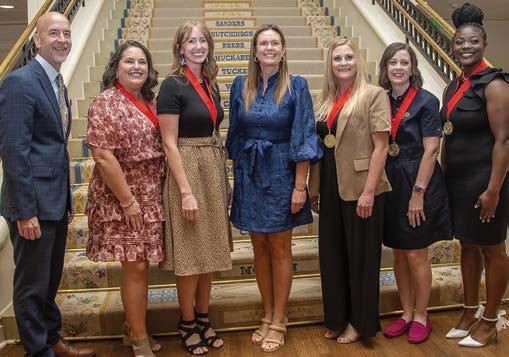
received a $1,000 prize provided by the Walton Family Foundation.
The other 10 Top 15 Finalists were as follows:
• Brad Beatty, a fifth grade math and science teacher at Russellville Intermediate School
• Heidi Faught-Strong, a fifth grade math and science teacher at Main Street Visual and Performing Arts Magnet School in the Hot Springs School District
• Susan Ford, a grades 7-8 instrumental music teacher at Cabot Junior High North and Cabot Junior High South
• Danny Hobson, a grades 9-12 theatre and technical theatre teacher at Alma High School
ATOY SEMI-FINALISTS.
Pictured are, from left, Secretary of Education
Jacob Oliva, Alana Ashworth from the Prairie Grove School District, Stephanie Williams from the Benton School District, Gov. Sarah Huckabee Sanders, Gretchen Freyaldenhoven from the Greenbrier School District, Elaina Weaver from the Bryant School District, and Chenal Dale from the Fayetteville School District.
• Victoria Golden, a third grade English language arts teacher at Dr. Marian G. Lacey K-8 Academy in the Little Rock School District
• Tarji Russell-Chaffin, a grades 9-12 biomedical science teacher at Dumas High School
• Kevin Sherman, a grades 7-12 instrumental teacher at Stuttgart High School
• Kaitlin Smith, a grades 10-12 science and English as a second language teacher at Conway High School
• Misty Smith, a sixth grade science teacher at Goza Middle School in the Arkadelphia School District
• Jessie Walls, a second grade teacher at the Jim D. Rollins School of Innovation in the Springdale School District




Nabholz is proud to have served our people, clients, and communities for the past 75 years. In that time, we’ve completed athletic facilities of all types and sizes — delivering high quality work to fulfill our client’s vision and needs.